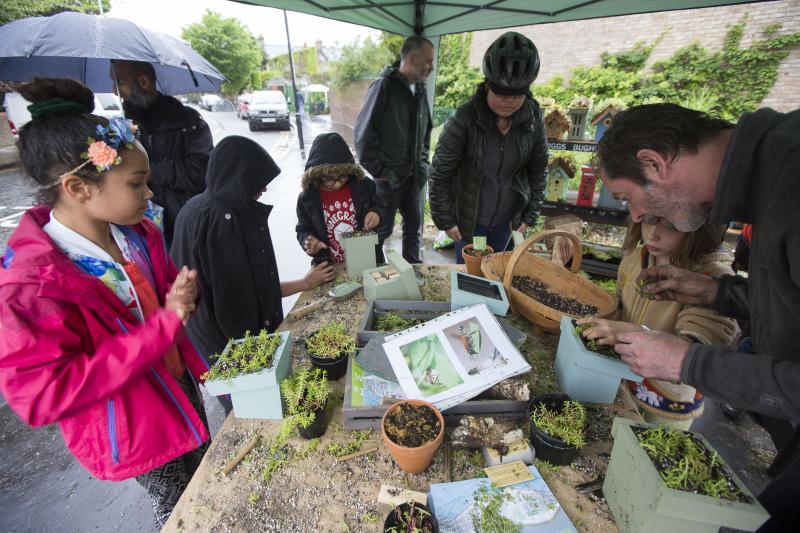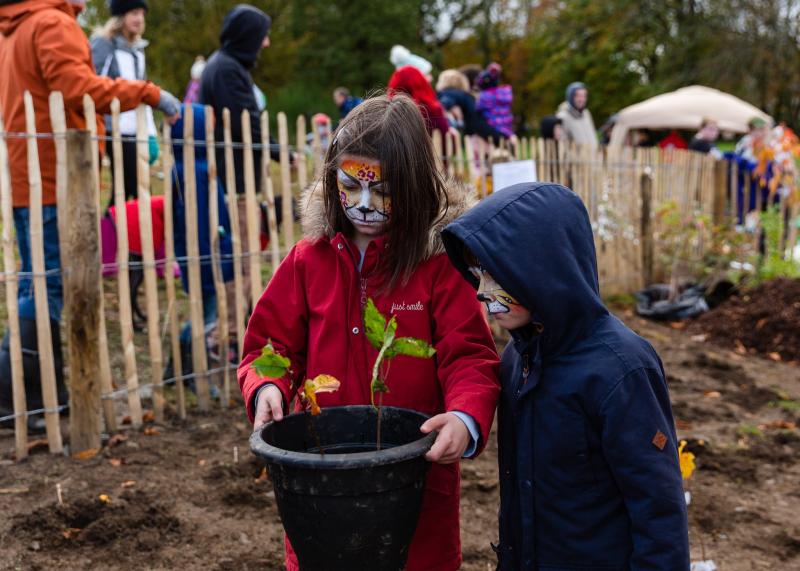Joanna Watson25 May 2022
Since the pandemic we’ve all realised just how important it is to be able to connect with nature - for our health, our wellbeing and for building a sense of belonging.
Many areas of our towns and cities are nature-deprived and people of colour and other marginalised groups are more likely to live in areas with fewer nearby green spaces. Being unable to easily access nature can result in worse physical and mental health outcomes and reinforces wider inequalities.
Although Friends of the Earth has been working on nature issues for decades, we want to better understand what barriers these communities are currently facing and how we might campaign on policies that better meet their needs. At the same time, we know that there is enormous energy and creativity out there and we want to learn more about what is working at the local level to address this nature deficit and connect people with nature and each other.
We set up our Local Nature Innovation Fund to help a few projects that aim to better engage people in nature activities, whether it’s growing food, or getting kids out into the countryside; through arts activities or being outdoors; sharing skills and knowledge or educating children about nature.
We’re excited to see what the project leaders find out and we’re encouraging them to document their projects and share their learnings and experiences.
So what happened?
We promoted the fund through our networks and at a Q&A session with the Black Seeds Network, for a few weeks. We were delighted to receive over 50 applications for a diverse range of projects. Encouragingly many of them are dedicated to involving people from nature-deprived areas or from disadvantaged groups, the disabled, refugees and migrants, the elderly, or those struggling with their mental of physical health. Others were about nature restoration or learning from different farming techniques. All the projects were useful and worthwhile, and we wished we could support more of them.
Our final decisions were based on identifying a portfolio of different approaches that met our criteria:
- Engage people who are currently under-represented or marginalised in nature activities
- Strong learning objectives
- Originality of idea (what we could learn)
- Whether it could be easily replicated
- Diversity of those benefitting from the project
- Potential for network building
- Feasibility – could it be done in the time
- Would our upper limit of £1000 make a significant contribution to the success of the project
Who was successful and what do we hope to learn?
By funding local innovative projects, we are testing 11 hypotheses.
Hull Food Partnership, Yorkshire
If we involve disabled young people in sustained creative growing challenges, they will develop the habit of eating locally grown vegetables, spend time out of doors and improve their wellbeing.
Black Trail Runners, London/Luton
If we provide dedicated groups, taster sessions and events, more Black and People of Colour (BPOC) will engage with nature through exercise and overcome some of the barriers they currently face to feeling comfortable outdoors in the countryside.
Tai Calon, Blaenau, Gwent
If we provide a free seedbank and plant library and cookbook swap for people living in social housing, more people will get growing in their own homes or communal gardens, improve their diet and support habitat creation.
Time to Grow Walthamstow, East London
If we repurpose disused gardens as growing spaces, where voluntary labour is exchanged for a share of the harvest, we can catalyze a self-sustaining cooperative economy.
Kingsmeadow@Made Forever, Kingswood, South Glos
If we offer one-to-one mentoring and support sessions to hard-to-reach people, it will give them the confidence to feel comfortable in a nature-based environment and stay involved in nature projects for the longer term.
Totnes Community Herbal, Devon
If we facilitate explorative nature connection sharing circles, we can safely explore the intersecting issues around colonialism, rural racism, identity and land, for Black and People of Colour (BPOC) in rural nature-based settings.
The Village, Tower Hamlets, East London
If we run mushroom cultivation workshops based on identity, we can engage the Queer, Trans People of Colour(QTPOC) in nature regeneration.
Black and Green Ambassadors, Bristol
If we use multi-media storytelling techniques to share practices, knowledge and skills from the BPOC community, we can encourage more people to engage with nature and the wider environmental movement.
Mountford Growing Community, Hackney, East London
If we co-create intergenerational skills sharing sessions, we can engage young people and elders in greening and learning about their environment and reduce social isolation and disconnection from nature.
Oxford City Farm, Oxford
If we facilitate multi-lingual sessions run by BPOC facilitators, we can support refugee women to develop sustained engagement with nature in an unfamiliar country.
Flourishing in St Pauls, Bristol
If we share vertical-growing techniques and skills through workshops and prototypes in educational settings, we can transform flats, maisonettes and bedsits into valuable green space.
What happen next?
Some projects have yet to start; others are underway and we are funding new elements. The projects run from June to October and we will be checking in over the next few months to find out how they’re getting on. We plan to share useful insights and experience - both successes and challenges. Learning from what doesn’t work is equally as important as learning from what does.
We wish everyone who applied the very best of luck in taking forward their ideas and are sorry we couldn’t support all the wonderful and creative ideas that came our way.



